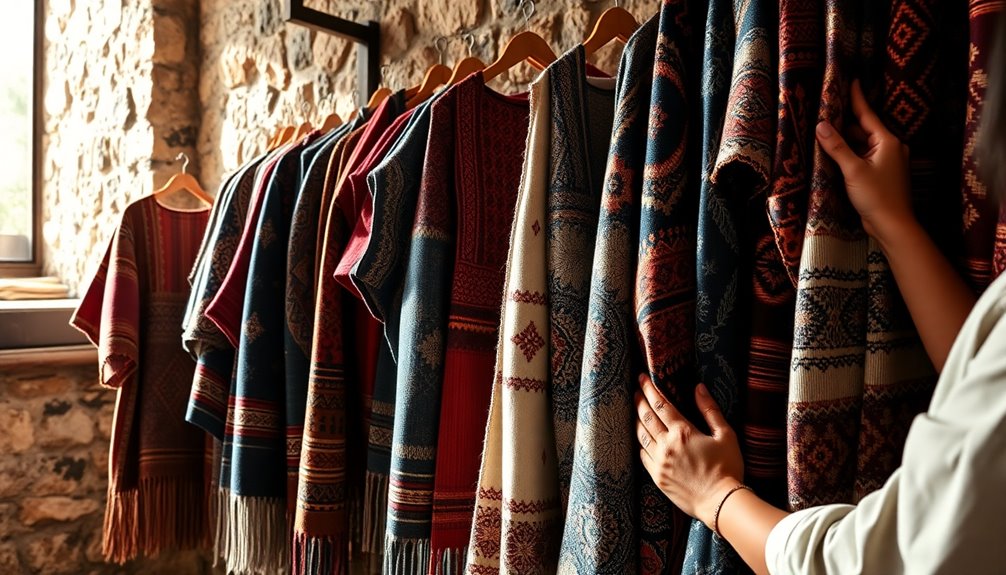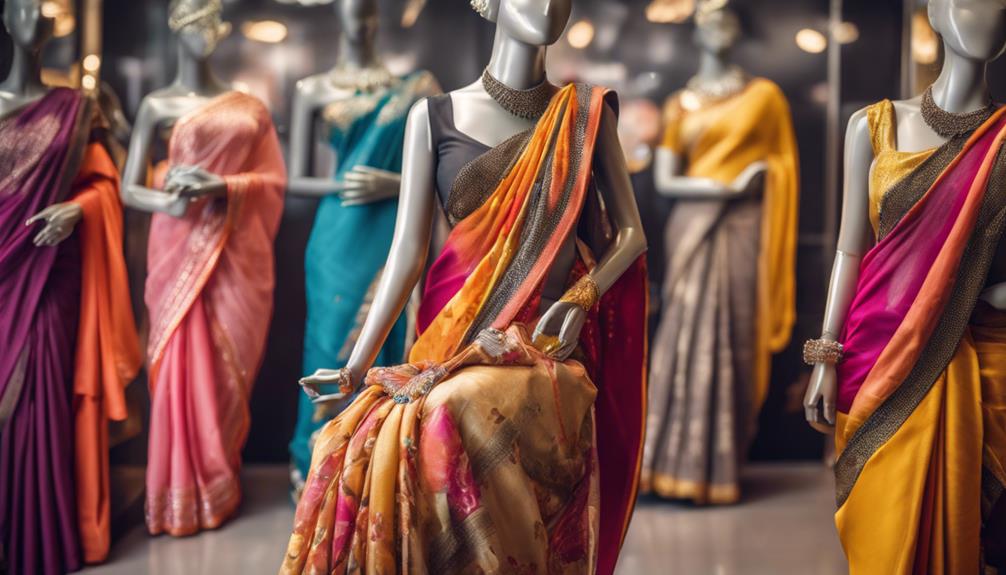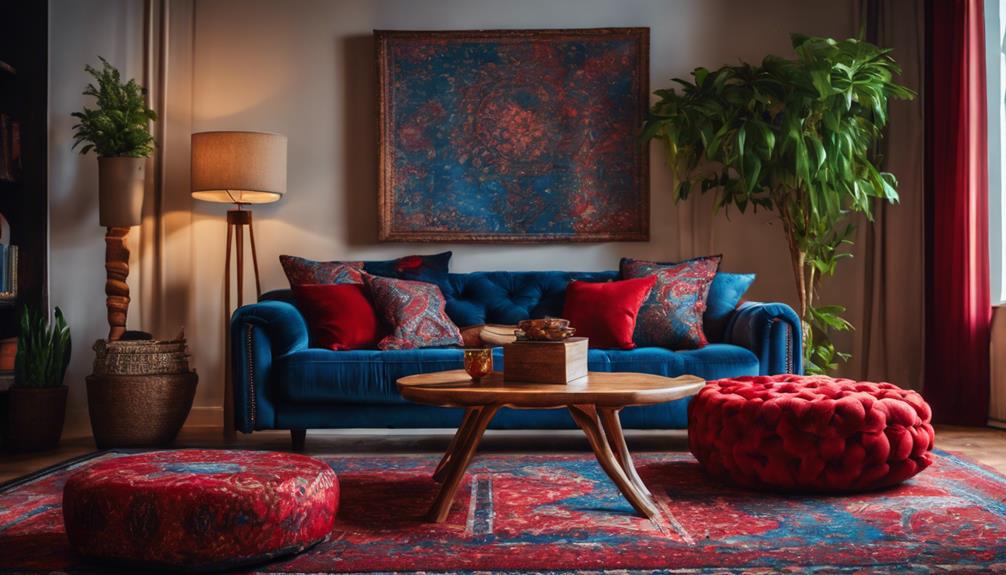When you choose clothes made in Spain, you're embracing artisan quality that tells a story. These garments showcase traditional craftsmanship, with techniques that date back centuries. From exquisite hand embroidery to sustainable textiles, Spanish artisans pour their heart into every piece. You'll find unique styles that not only highlight individuality but also reflect cultural heritage. Plus, the focus on small-batch production makes these items environmentally friendly. With various styling options, you can easily incorporate these standout pieces into any wardrobe. Keep exploring, and you'll discover more about the rich world of Spanish fashion and craftsmanship.
Key Takeaways
- Spanish artisan clothing showcases traditional craftsmanship, combining unique regional techniques with cultural heritage for high-quality, sustainable fashion.
- Hand-stitched embroidery and unique textile techniques highlight the intricate artistry and dedication of Spanish artisans in each piece.
- Emerging brands prioritize eco-friendly materials and ethical production, promoting sustainable practices within the fashion industry.
- Artisan pieces can be styled with timeless basics and layered for a versatile look, enhancing personal style while celebrating craftsmanship.
- Fashion activism in Spain supports local economies and preserves artisan techniques, fostering a community dedicated to ethical fashion and cultural heritage.
Origin and historical background of the fashion trend/style
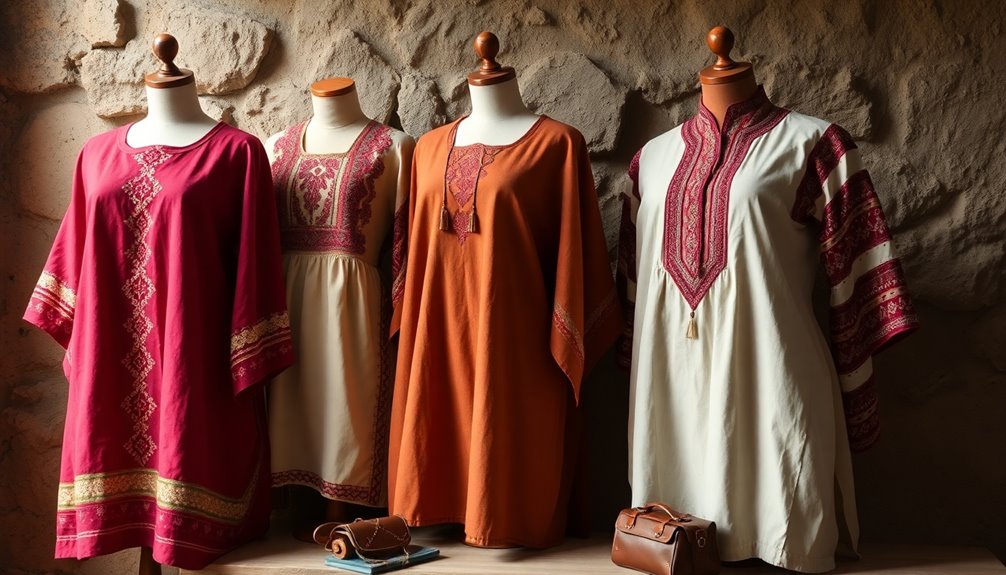
You might be surprised to learn that Spain's fashion scene has deep roots in traditional craftsmanship, dating back to the Middle Ages.
This rich cultural heritage is reflected in the unique styles that regional artisans create, using techniques passed down through generations.
Today, as you explore the revival of artisan clothing, you'll see how these traditions blend seamlessly with modern design, emphasizing quality and sustainability.
Traditional Craftsmanship Revival
The revival of traditional craftsmanship in Spanish fashion draws from a rich tapestry of artisanal techniques that have been honed since the Middle Ages. Back then, local communities meticulously crafted textiles and garments, passing down these skills through generations.
Today, you're witnessing a resurgence in handmade clothing, fueled by a growing desire for sustainable and unique fashion pieces that reflect authenticity.
Spanish artisans are renowned for their exceptional skills in hand embroidery, weaving, and leather craftsmanship, which contribute to the distinct identity of various regional styles. This trend emphasizes quality over quantity, with brands now focusing on small-batch production and local sourcing.
By doing so, they not only reduce environmental impact but also support local economies.
Moreover, organizations and collectives have sprung up to promote traditional crafts in Spain, ensuring that these age-old techniques are preserved and adapted to contemporary fashion.
This dynamic movement fosters a new generation of artisans who are passionate about their craft.
When you choose artisan craftsmanship in your wardrobe, you're not just wearing clothes; you're embracing a legacy that celebrates skill, sustainability, and cultural richness.
Cultural Heritage and Traditions
Often overlooked, Spain's cultural heritage serves as a vibrant foundation for its fashion landscape, weaving together influences from Moorish, Roman, and various regional traditions. This rich tapestry of history shapes the artisan clothing you'll find today, where each piece tells a story of craftsmanship and cultural identity.
Artisan clothing in Spain often showcases traditional techniques like hand-stitched embroidery, weaving, and dyeing, which artisans have perfected over generations. These methods not only preserve local craftsmanship but also celebrate the unique character of each region.
For instance, Galicia and Andalusia are famed for their distinctive fabric production, utilizing natural fibers like linen and cotton.
As you explore Spanish fashion, you'll notice how artisans draw inspiration from their surroundings. Vibrant colors and motifs reflect the landscapes, festivals, and cultural symbols that define their identities.
This revival of artisan fashion not only honors historical roots but promotes sustainable practices. Many brands focus on local sourcing and ethical production, ensuring that the cultural integrity of artisan clothing is maintained.
Key Characteristics
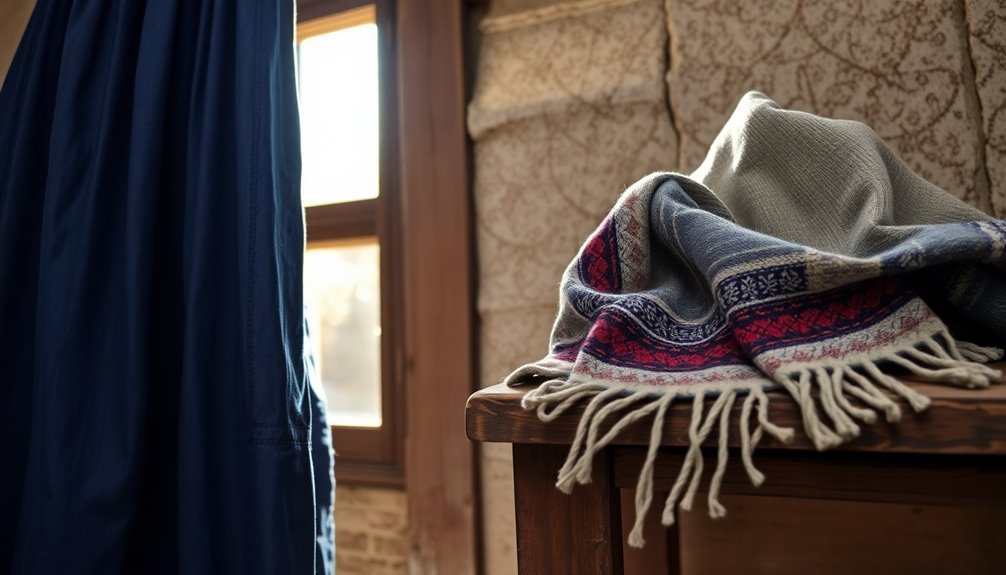
When you explore Spanish artisan clothing, you'll notice unique stitching techniques that set each piece apart.
These garments often feature natural fibers and earthy tones, reflecting the beauty of the surrounding landscape.
Plus, the signature artisan textiles highlight the craftsmanship that makes Spanish fashion truly exceptional.
Unique Stitching Techniques
Unique stitching techniques in Spanish artisan clothing bring a rich tapestry of cultural heritage to life. When you wear these garments, you're not just sporting a piece of clothing; you're embracing a story woven into every thread.
One of the hallmark methods is "bordado a mano," or hand-stitched embroidery, which showcases intricate designs that reflect local traditions and artistic flair.
You'll often find "punto de cruz," or cross-stitch, used to create textured patterns that resonate with the craftsmanship of the region. This technique tells a story, connecting you to the past with each stitch.
Additionally, some artisan clothing features "sashiko," a Japanese technique adapted in Spain. This method reinforces the fabric while adding decorative motifs, ensuring both durability and aesthetic charm.
Look out for "trapunto," a quilting style that adds dimension to textiles, enhancing their visual and tactile qualities.
These unique stitching techniques not only elevate the beauty of artisan clothing but also celebrate the skill and dedication of Spanish artisans.
Natural Fibers and Earth Tones
Spanish artisan clothing not only showcases intricate stitching techniques but also highlights the use of natural fibers and earth tones that reflect the region's beauty.
When you choose garments made from natural fibers like cotton, linen, and wool, you're embracing breathability and durability, ensuring high-quality wear. These materials not only feel good against your skin but also stand the test of time.
Earth tones, including rich shades of brown, green, and ochre, dominate the color palette of Spanish artisan fashion. These hues connect you to the stunning landscapes of Spain, grounding your wardrobe in nature.
Moreover, many brands prioritize eco-friendly dyes derived from natural sources, minimizing harmful chemicals and promoting sustainable practices.
Signature Artisan Textiles
The charm of artisan textiles lies in their handmade elements that showcase traditional craftsmanship and local materials, reflecting the rich cultural heritage of Spain. When you wear these pieces, you're not just donning a garment; you're embracing a story steeped in history and artistry. Techniques like hand weaving, embroidery, and natural dyeing highlight the unique skills of artisans, resulting in distinctive, one-of-a-kind items that stand out in your wardrobe.
Many artisan textiles utilize premium European fabrics sourced from Spain, Italy, and Portugal, ensuring exceptional quality and durability.
You'll find that each piece often embodies ethical production practices, as small-batch manufacturing in family-run workshops maintains the integrity of craftsmanship. This approach not only preserves traditional techniques but also contributes to sustainable fashion by reducing the carbon footprint linked to mass production and global supply chains. In fact, such practices are part of a broader trend toward environmental innovations that emphasize sustainability in fashion.
Incorporating artisan textiles into your wardrobe means investing in quality and sustainability. Each garment reflects a commitment to artistry and ethical practices, allowing you to wear something that's not just beautiful, but also meaningful.
You'll appreciate the uniqueness and depth that these textiles bring to your style.
Modern Interpretation
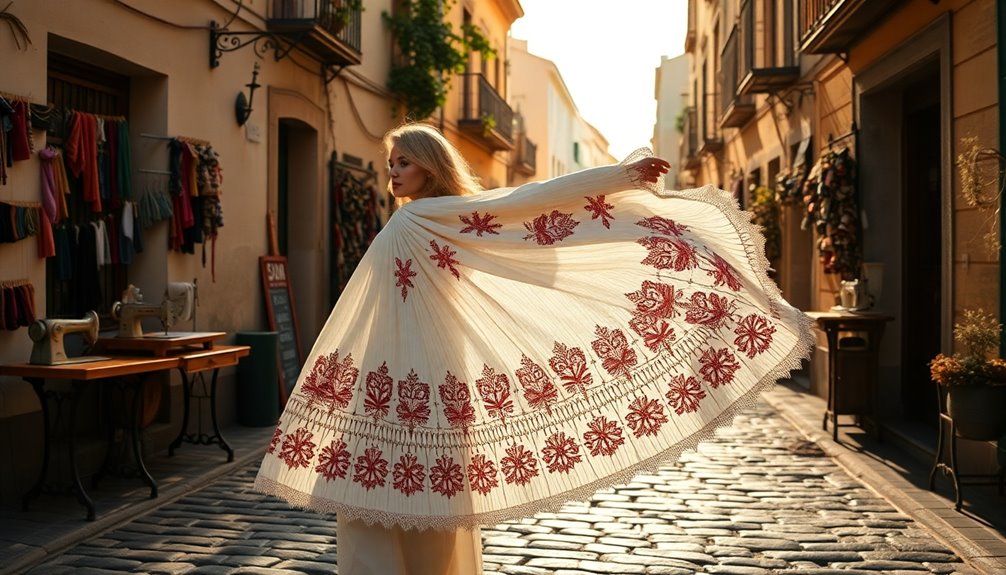
You'll notice that modern Spanish fashion is embracing sustainable fabric innovations that reflect a growing awareness of environmental impact.
Emerging sustainable fashion labels are stepping up, offering unique designs that celebrate artisan craftsmanship.
Plus, fashion icons are championing these styles, making it easier for you to support sustainable and ethical choices in your wardrobe.
Sustainable Fabric Innovations
Sustainable fabric innovations are transforming the Spanish fashion landscape, making it more eco-friendly and responsible. You'll find that many Spanish brands are now using organic cotton and recycled materials, significantly reducing the environmental impact linked to traditional textile production.
By opting for locally sourced materials, these brands not only support regional economies but also minimize the carbon footprint associated with transportation in the fashion supply chain.
Innovative textiles like TENCEL and linen are becoming increasingly popular, thanks to their biodegradability and reduced water consumption during production. You can rest easy knowing that many brands are adopting eco-friendly dyeing processes, which cut down on toxic chemicals, promoting healthier ecosystems and safer working conditions for artisans.
Moreover, advanced textile technologies are being utilized to create durable, high-performance fabrics that maintain the artisan quality you love while adhering to sustainable practices.
This means you're investing in fashion items designed for longevity, aligning with your values of sustainable fashion. As you explore these innovative fabrics, you'll discover a more ethical approach to style that doesn't compromise on quality or aesthetics.
Emerging Sustainable Fashion Labels
With the rise of innovative fabrics, Spanish fashion is now home to a wave of emerging sustainable labels that prioritize both quality and craftsmanship. Brands like Descendant of Thieves are leading the charge, sourcing premium materials from Spain and Italy while collaborating with local artisans to ensure meticulous detail in their collections.
You'll find that many labels, such as Nae and Organique, are dedicated to using eco-friendly materials like recycled PET, cork, and GOTS certified organic cotton, contributing significantly to sustainable fashion.
The emergence of brands like SKFK and TWOTHIRDS highlights a commitment to ethical production practices, with Fairtrade certifications and a focus on ocean conservation, respectively. These brands demonstrate that sustainability and style can go hand in hand.
Additionally, Spanish artisan brands often tell stories through their designs, drawing inspiration from local heritage and preserving traditional craftsmanship techniques.
As consumers increasingly seek unique, high-quality pieces, the trend towards slow fashion in Spain is evident. Brands like LEnvers and Brava Fabrics emphasize mindful consumption and ethical manufacturing, showcasing that sustainable fashion doesn't just look good—it feels good, too. Furthermore, many of these brands are aware of their environmental impact and strive for sustainable practices to minimize their ecological footprint.
Fashion Icons Advocating Artisan Styles
Numerous fashion icons have taken center stage in advocating for artisan styles, showcasing the rich craftsmanship of Spanish-made fashion. Penélope Cruz and Antonio Banderas regularly highlight the cultural significance of these designs, using their public appearances to promote artisan quality.
Influencer and designer Sara Carbonero actively supports local artisan brands on her social media, emphasizing the importance of ethical fashion and sustainable practices.
Brands like Desigual and Bimba y Lola illustrate the beauty of artisan techniques, incorporating unique prints and handmade details that reflect Spain's regional heritage. Celebrated designer Manolo Blahnik masterfully blends modern aesthetics with traditional craftsmanship, creating exquisite footwear that speaks to the heart of artisan quality.
Fashion events like Madrid Fashion Week have become essential platforms for emerging designers to showcase their artisan-quality clothing, helping revive traditional techniques and materials.
These icons and events not only elevate artisan styles but also pave the way for a broader acceptance of ethical fashion in the global market. By embracing these approaches, you contribute to a movement that values craftsmanship, sustainability, and cultural heritage in the ever-evolving world of fashion.
Styling Tips
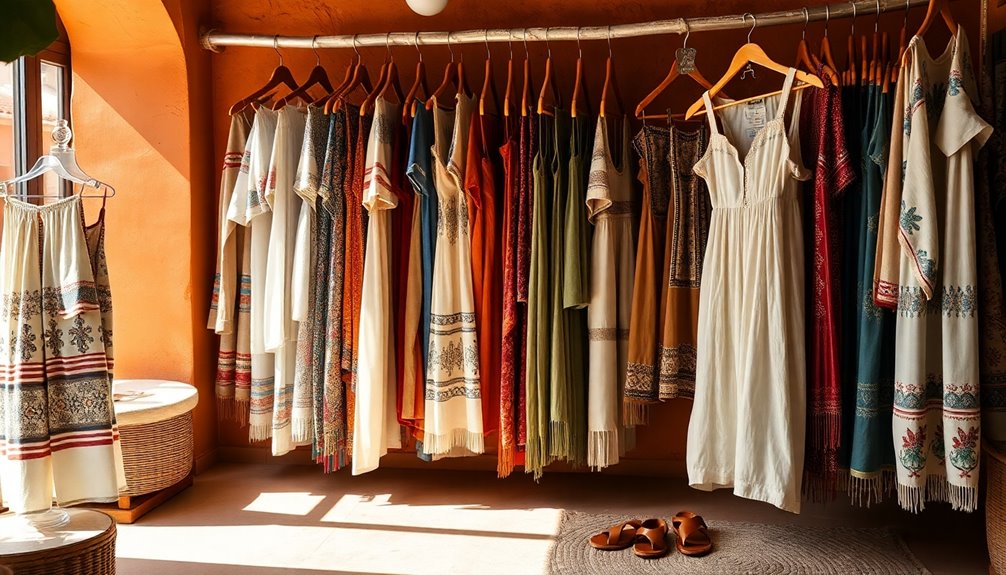
When styling your artisan pieces, focus on timeless basics that complement their unique craftsmanship.
Layering different textile combinations can elevate your look, creating depth and interest in your outfit.
Don't shy away from mixing patterns; it's a great way to showcase the vibrant spirit of Spanish fashion while keeping your ensemble fresh and dynamic.
Timeless Artisan-Inspired Basics
Embracing timeless artisan-inspired basics can elevate your wardrobe while celebrating Spanish craftsmanship. These pieces often feature traditional techniques, like hand embroidery and weaving, highlighting the unique artistry embedded in Spanish fashion.
By choosing artisan-inspired basics, you're not just adding quality items to your collection; you're also supporting local economies and preserving cultural heritage.
When styling these basics, keep it simple. Opt for minimalist accessories that enhance their intricate details without overshadowing them. A classic pair of earrings or a sleek handbag can perfectly complement your artisan-inspired look.
You can also mix and match these timeless pieces with contemporary items for a fresh twist. For example, pair a handwoven top with tailored trousers or a minimalist skirt to create a balanced outfit that merges tradition with modern trends.
This versatility makes artisan-inspired basics suitable for various occasions, from casual outings to more formal events.
Layered Artisan Textile Combinations
Layering artisan textiles offers a fantastic way to showcase your individuality and creativity in fashion. By combining different fabrics like handwoven linen and organic cotton, you can achieve a unique and textured look that's both comfortable and stylish.
Don't shy away from incorporating contrasting colors and patterns; these artisan pieces enhance visual interest and highlight the craftsmanship behind each garment.
In warmer months, opt for lightweight, breathable artisan fabrics to maintain versatility while staying chic. Experiment with layering techniques by mixing longer and shorter lengths, such as a handcrafted tunic over a fitted artisanal top, to create dynamic silhouettes that draw the eye.
Accessorizing is key to completing your layered outfits. Consider incorporating artisan-made pieces, like hand-embroidered scarves or unique jewelry, to elevate your overall look and support local craftsmanship.
When you layer artisan textiles thoughtfully, you not only express your personal style but also celebrate the artistry that goes into each piece. Additionally, consider using herbal alternatives for botox-like effects to enhance your skincare routine, which can complement your stylish outfits beautifully. So, get creative with your combinations, and let your wardrobe reflect the beauty of artisan textiles!
Textile Pattern Combinations
Mixing textile patterns can transform your outfit into a visually striking statement that reflects your unique style. When you combine different patterns, like stripes with florals or plaids with polka dots, you not only showcase your creativity but also highlight the artisan craftsmanship typical of Spanish clothing.
To keep your ensemble feeling cohesive, stick to a harmonious color palette. This way, your outfit looks intentional rather than chaotic.
Scale is crucial in pattern mixing; pairing a large print with a smaller one creates balance, allowing each pattern to shine. For instance, consider wearing a bold floral dress with a subtle striped jacket.
Accessories like scarves or bags featuring subtle patterns can tie the whole look together, adding sophistication and artistry.
Don't forget that using artisan-made textiles elevates your style while supporting local craftsmanship and sustainable fashion practices in Spain. By embracing these unique, traditional patterns, you not only look fabulous but also contribute to preserving cultural heritage. Additionally, incorporating energy-efficient models can enhance your overall aesthetic while being mindful of your environmental impact.
Shopping Guide
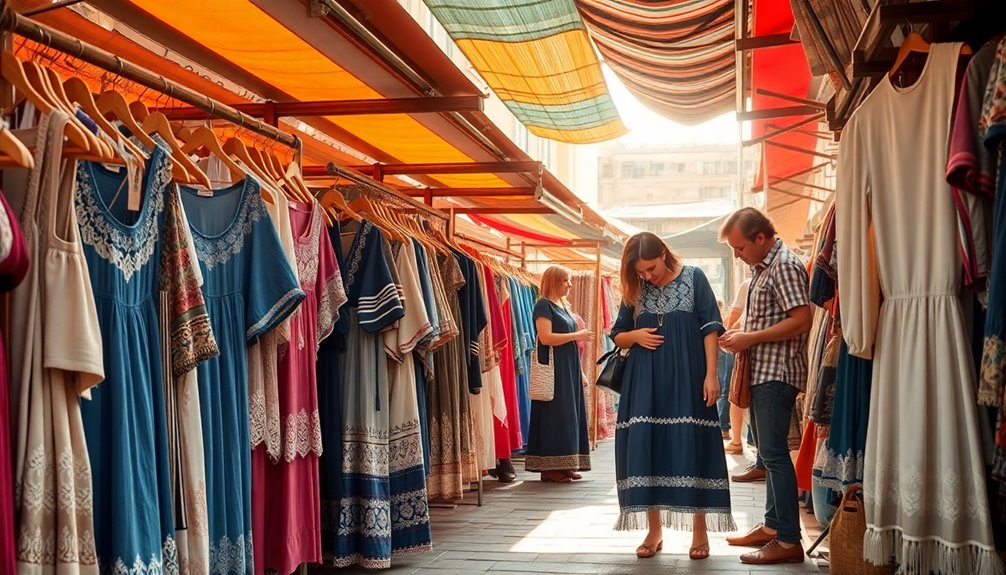
When exploring the vibrant world of artisan clothing made in Spain, you'll want to focus on brands that highlight local craftsmanship and prioritize high-quality, regionally sourced materials.
Look for names like Descendant of Thieves and Mónica & María, which emphasize small-batch production. Each piece from these brands showcases meticulous craftsmanship and unique design, giving you something truly special to wear.
As you shop, consider collections that incorporate traditional techniques like embroidery and weaving. These methods not only reflect the rich cultural heritage of Spain but also support local artisans and help preserve their invaluable skills.
You'll find that each item tells a story, connecting you to the artistry behind it.
Additionally, seek out brands committed to ethical production practices and transparency. These brands often provide insights into their sourcing and labor practices, allowing you to make informed choices.
Remember, by choosing artisan clothing, you're not just purchasing a garment; you're supporting local economies and fostering a deeper connection to the artistry of Spanish fashion.
Enjoy your shopping journey, and relish the unique finds that celebrate craftsmanship and culture!
Upcycling Old Artisan Garments
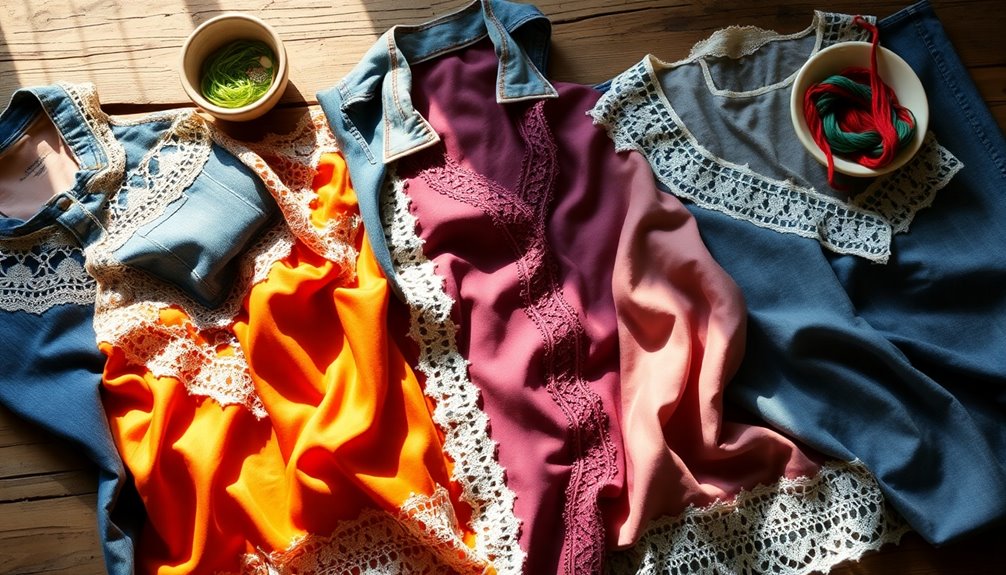
When you repurpose vintage artisan fabrics, you're not just creating something new; you're honoring the craftsmanship that went into those original pieces.
Using patchwork fabric remnants allows you to blend different textures and patterns, resulting in a unique garment that tells a story.
This process not only gives new life to old materials but also supports sustainable fashion practices.
Repurposing Vintage Artisan Fabrics
Repurposing vintage artisan fabrics brings a fresh perspective to sustainable fashion, allowing you to embrace unique pieces that celebrate traditional craftsmanship.
By upcycling old artisan garments, you contribute to a more sustainable future while enjoying one-of-a-kind clothing that tells a story. This process not only reduces textile waste but also preserves the cultural significance of these beautiful fabrics.
Artisans often employ various techniques, like patchwork and embroidery, to enhance the aesthetic appeal of upcycled garments. These skills transform vintage materials into stunning fashion statements that stand out in any wardrobe.
When you choose to wear these repurposed items, you're not just making a fashion choice; you're also supporting local artisans and their traditional crafts.
Moreover, upcycling old artisan garments helps minimize the carbon footprint associated with the fashion industry. You're reducing the demand for new raw materials and manufacturing processes, which is crucial for our environment. Additionally, the use of non-toxic materials in upcycled garments ensures safe and environmentally friendly fashion choices.
Patchwork Fabric Remnants
Patchwork fabric remnants offer a vibrant way to breathe new life into old artisan garments, transforming them into unique pieces that celebrate both creativity and sustainability. By upcycling these remnants, you not only reduce textile waste but also preserve the craftsmanship and cultural heritage embedded in each piece.
This practice is sustainable, extending the lifecycle of materials and significantly decreasing the demand for new fabric production, which can harm the environment.
When you wear patchwork garments, you showcase a diverse array of colors, patterns, and textures that highlight the artistry of various artisans. Each item tells a story, making your wardrobe more personal and meaningful.
Additionally, utilizing leftover fabric supports local economies, reinforcing the importance of community and ethical craftsmanship in the fashion industry.
Upcycled patchwork clothing exemplifies slow fashion principles, encouraging you to invest in timeless, high-quality pieces. By choosing these garments, you contribute to a more sustainable wardrobe while enjoying truly one-of-a-kind fashion items.
Cultural Impact
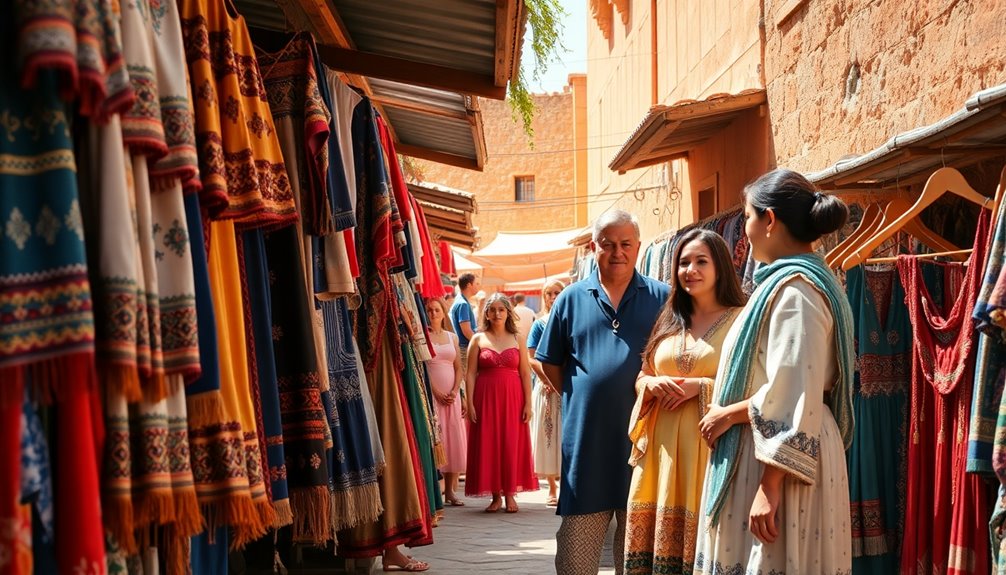
When you explore the cultural impact of Spanish artisan clothing, you'll find a vibrant connection to film and music that inspires designers and creators alike.
This intersection of fashion activism and community engagement not only celebrates local heritage but also empowers artisans to share their stories.
Film and Music Inspirations
Spanish cinema and music consistently inspire the fashion world, blending traditional craftsmanship with contemporary styles. Films like "Volver" and "The Sea Inside" highlight artisan culture, showcasing the intricate details of artisan clothing brands that reflect Spain's rich heritage.
You can see how these cinematic elements permeate fashion trends, prompting designers to create collections that honor local artisans.
Iconic musicians, such as Paco de Lucía and Rosalía, also play a vital role in shaping fashion. Their unique styles merge traditional influences with modern aesthetics, encouraging you to embrace a diverse range of looks.
Events like the San Sebastián International Film Festival further emphasize this connection, where designers draw inspiration from film themes and characters, making fashion an integral part of storytelling.
Music festivals like Primavera Sound champion eco-conscious fashion, spotlighting artisan clothing brands that align with sustainability efforts.
Collaborations between fashion designers and filmmakers, like Agatha Ruiz de la Prada and Pedro Almodóvar, illustrate the powerful cultural impact of film on contemporary fashion aesthetics.
Fashion Activism and Community Engagement
Fashion activism in Spain is transforming the landscape of the industry by championing the preservation of traditional artisan techniques. This movement helps maintain cultural heritage while simultaneously supporting local economies through the promotion of handmade clothing.
You'll find that many Spanish brands, like Caravana and Studio Tia, focus on ethical production practices that celebrate cultural identity and empower local artisans. By providing fair wages and sustainable working conditions, they ensure that traditional craftsmanship is passed down through generations.
Community engagement initiatives thrive as contemporary designers collaborate with local artisans, fostering pride and ownership within communities. Events such as artisan markets and workshops facilitate direct connections between consumers and makers, allowing you to engage with cultural narratives and strengthen local fashion ecosystems.
As awareness grows regarding the environmental and social impacts of fast fashion, you're encouraged to support brands prioritizing sustainability and ethical practices. This approach mirrors the importance of self-care practices in promoting overall well-being, emphasizing the need for mindful consumption.
Fashion activism isn't just about clothing; it's about creating a movement that values craftsmanship, community, and environmental responsibility. By participating in this movement, you contribute to an industry that respects both people and the planet.
Frequently Asked Questions
Which Luxury Brand Is Made in Spain?
If you're looking for luxury brands made in Spain, you've got some fantastic options.
Balenciaga stands out with its innovative designs and craftsmanship.
Loewe's luxury leather goods showcase traditional Spanish techniques.
You can also find Chanel's iconic leather handbags produced in Spain, meeting their high standards.
Don't forget about Manolo Blahnik, famous for exquisite shoes, and Ágatha Ruiz de la Prada, known for vibrant, playful designs that reflect Spain's cultural heritage.
What Are the Best Spanish Brands?
When you're looking for the best Spanish brands, consider Descendant of Thieves for artisan craftsmanship, or SKFK, which excels in sustainable practices.
If you love knitwear, LEnvers offers organic materials and mindful consumption.
For unique designs, check out Thinking MU, known for its commitment to sustainability.
Lastly, Ecoology, based in Barcelona, creates fashionable pieces from organic and recycled materials, promoting responsible production while supporting local economies.
You won't be disappointed!
Which of the Following Is a Famous Clothing Brand From Spain?
When you think of famous clothing brands from Spain, Zara immediately comes to mind. Known for its fast fashion model, Zara has stores worldwide and offers trendy styles at accessible prices.
Mango is another top contender, specializing in contemporary women's fashion. You can't overlook Desigual, with its vibrant and unique designs.
Each brand showcases Spain’s rich fashion culture, making them popular choices for style-conscious shoppers around the globe. These brands not only emphasize traditional craftsmanship but also incorporate contemporary designs that appeal to a modern audience. As a result, Spanish clothing stores online have become increasingly sought after, providing easy access to these unique styles for fashion enthusiasts worldwide. With a diverse range of options, from casual wear to haute couture, shoppers can effortlessly bring a piece of Spain’s vibrant fashion scene into their wardrobes.
What Is Artisan Clothing?
Artisan clothing refers to garments crafted with a focus on handmade techniques and skilled artistry.
You'll find that these pieces often showcase unique designs and cultural significance, reflecting local traditions.
By using locally sourced materials, artisan clothing supports regional economies and reduces global supply chains.
When you wear such items, you're not just donning fabric; you're embracing stories and heritage, all while fostering emotional connections to the craftsmanship behind each piece.
